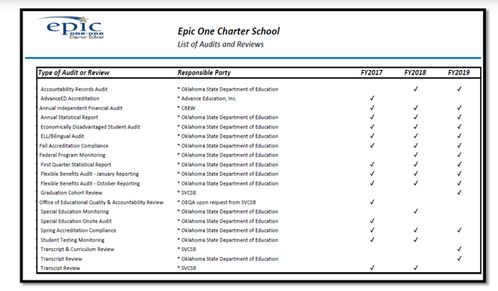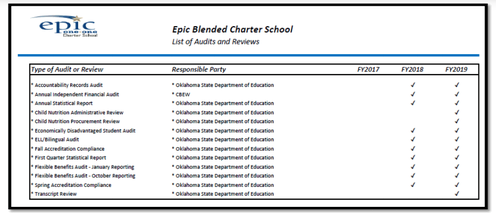
Torn Apart One Section at a Time
Part III
State Idiot/Auditor Cindy Byrd Using Opinion Instead of State Law on Accounting Codes Used by the State Department of Education
Three weeks ago we exposed the lies that Lying Cindy Byrd had told at her press conference and used in her hatchet job of an audit and we covered another section of the “audit” last week.
The first huge lie was about the teacher retirement system payments and we included the actual emails proving exactly how Epic was instructed to report retirement pay to the system and exactly how to calculate the money owed to the retirement fund.
The second huge lie was Chapter 5 on the learning fund and how it was calculated. Again, we provided the actual contract pages and LEA forms where Epic had actually circled the numbers that were REQUIRED to be used by charter schools by the SDE and the State Charter School Board.
The third huge lie was over the Accountability and Oversight section of her “audit”, where it was shown that the State Department of Education, the State Virtual Charter School Board, Rose State College, Epic itself, and the Communities Strategies school board were all doing audits, SDE had done over 60 reviews in the past three years alone.
This week we are picking one more of the many other lies made in Lying Cindy's “audit”. The categories below are from Lying Cindy's own “audit” and the three already addressed are in green type. The one we will cover in this issue is in blue type.
Chapter 1 Accountability and Oversight
Chapter 2 Oklahoma Cost Accounting System
Chapter 3 Payroll
Chapter 4 Allocated Dues and Fees
Chapter 5 Student Learning Fund
Chapter 6 Community Strategies-CA, LLC
Chapter 7 Audits and Reviews
Chapter 8 Other Issues
This week we will prove to you that Lying Cindy Byrd ignored how the State Department of Education ordered charter schools, including Epic, to code financial transactions. Lying Cindy presented her opinion of how a state statute worked instead of allowing the administrative agency to explain how the accounting codes were set up.
Here is a link to the SAI, State Auditor and Inspector “audit”. Scroll down to page 24 through 41 for the discussion of Chapter 2, Oklahoma Cost Accounting System.
Chapter 2 is divided into six sections. Section one lays out the statutes and rules used by SDE and OVCSB to classify money spent into specific accounting codes. As an example, there will be a specific accounting code to report building rent or lease, another for electric bills, and other codes for administrative expenses. Keep in mind that all of this was written and used for government schools, not charter schools, and Epic had been following SDE and OVCSB recommendations on coding the administrative and other expenses for the past eight years.
Section 2 finally gets around to making accusations. There is a deadline on reporting expenses to the SDE and OVCSB, driven by federal reports made annually and the need to lock down data so the report can be generated and filed. Lying Cindy Byrd believed that Epic changed the accounting codes to prevent $2.9 million dollars of penalties from being charged against Epic.
For four months in late 2016 Epic and the SDE and OVCSB went back and forth on the proper accounting code for millions of dollars worth of expenses. This is all documented in emails between the two parties. In February of the next year SDE did lock down the data and accepted the data as submitted and that was the end of the back and forth over how to code the expenses. SDE accepted the coding and certified Epic in compliance.
Section 3 deals with this made up controversy, claiming that the account coding that SDE accepted and certified was improper and resulted in over payment to Epic. Keep in mind that these are valid expenses incurred by Epic and by public schools, the only fuss is over what accounting code to report them under.
Section 4 covers 2017 through 2019 expense reporting. The “audit” complained that the account codes had changed between submission and the final year end report. Well... SDE was asking them to do the same thing the previous year and there was obviously some disagreement between what Epic's agreement with their own school board for Epic and how the SDE wanted things done. Lying Cindy isn't claiming money was misspent or stolen; she is complaining that the accounting codes it was applied too were inaccurate.
The last part of section 4 went over how Epic lost over a half million dollars due to a penalty charged because their administrative costs were 00.58% higher than allowed, just over one half of one percent higher than allowed. Epic saw their next check from SDE reduced by this half million dollars penalty caused mostly by coding errors.
Section 5 covers a new law, HB 1395, passed in 2019 that required detailed invoices from charter school management companies. The complaint is that detailed invoices were given by Epic but once again, the account coding wasn't completed. Epic had till September 1st to report, Lying Cindy is complaining that the coding wasn't completed at the end of the fiscal year as of July 15th. Her other complaint is that as EYS runs both Epic One on One and the Blended Learning Center, they allocated costs and expenses to each school as a percentage. Each school has a different number of students so they simply split the expenses between the two schools proportioned by the number of kids enrolled. Lying Cindy isn't claiming money was missing or misspent; once again she is arguing technicalities and splitting hairs. EYS did report each school as separate entities and kept the books separate for each school, they just split the management costs pro rata.
Section 5 rehashes the previous section to fluff things up a bit it seems. Their main argument is that the 10% fee that EYS collects ought to be reported as 100% admin costs... which would mean they would be twice the allowed admin costs each year and have their income cut in half. Completely asinine to suggest that a contract between a school board and EYS, approved and monitored by SDE and OVCSB, would be fatally flawed.
You can find Epic's response to the State Auditor during actual “audit” at this link. Look on the left upper corner and find the page number text box to quickly go down to the correct page shown below.
Go down to the middle of page 3 where Epic's response on the Oklahoma Cost Accounting System starts. The section stops on page 5, right above the heading “Payroll Findings”
Epic disputes that it avoided a $2.9 million dollar administrative cost penalty. Just before the Oklahoma Cost Accounting System submission deadline in 2016 SDE had removed the accounting code used in the previous years without notifying Epic that the code had been deleted. So their accountants used a placeholder code, an administrative cost code so the expense was in the right category. They found that the Oklahoma Administrative Code allowed all schools to change their code submissions between September and December 15th so they reclassified the management fees into the accounting codes that best fit.
Remember that prior to 2019 there was no legal requirement for charter schools to provide detailed invoices or code the management fee in a certain way. SDE helped make the decisions on the codes used and as even Lying Cindy has said,, SDE certified the Epic books a few months later.
Lying Cindy would have you believe that Epic was supposed to just absorb a $2.9 million dollar penalty when not only was there no penalty, there was no statutory reason to charge a penalty. This is like the IRS claiming that because you filed your tax return on time and paid it in full you somehow avoided penalties and now must pay a penalty for avoiding a penalty.
The State Department of Education, the SDE, is the only entity responsible for ensuring the Oklahoma Cost Accounting System is followed. For the past eight years SDE has constantly reviewed Epic, doing 54 separate reviews of Epic in the last three years. Anytime a question arose on which accounting codes to follow it was the SDE that chose the very broad and very numerous OCAS codes, after all they are the experts on the codes. And for eight years the SDE has re certified Epic.
Lying Cindy Byrd stated an opinion in her “audit” and that differed with how the SDE had been ordering Epic to handle the codes. The SDE is the expert, they approve everything, and they have the final say in how the expenses are coded.
The final allegation by Lying Cindy was that Epic submitted estimates instead of the actual cost of the management fees. Which is a lie, Epic's contract with EYS which is the for profit company that actually runs the schools, is quite simple. 10% of incoming revenue goes to the company for their work in running the school. You know how many kids they had for the year, you know how much the state paid Epic, 10% goes to EYS.
Prior to 2019 as there was no statute requiring itemized management fees, there was no law to be broken. In fact, Epic and the Blended Learning Center voluntarily provided itemized invoices to the SDE. Nor was there a legal requirement to code using specific OCAS codes. And everything that Epic did was approved by the SCE and each and every year the SDE re certified the schools.
In 2017,201/8, and 2019 Epic and the Blended Learning Center were subjected to over sixty different audits and reviews. Lying Cindy even published a list of these examinations in her “audit”.

